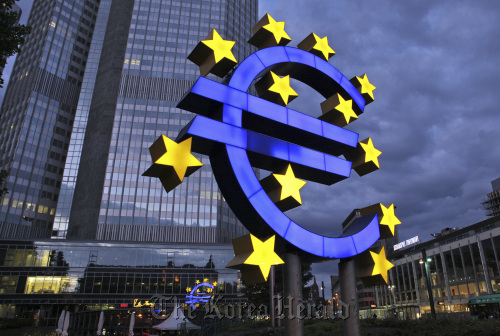FRANKFURT (AP) ― Many economists think the European Central Bank will signal Thursday that it now sees less risk of unexpected inflation ― and will make it clear that interest rates will not be heading higher for some time.
No rate change is expected when the bank’s 23 member governing council meets Thursday at its Frankfurt, Germany headquarters to discuss rate policy for the 17 countries that share the euro currency.
Attention will focus on President Jean-Claude Trichet’s post-decision news conference, where he will face questions about the bank’s role in fighting the eurozone’s government debt crisis. The bank last week stepped up risky purchases of Italian and Spanish bonds to keep bond market turmoil from dragging down those countries’ finances.
No rate change is expected when the bank’s 23 member governing council meets Thursday at its Frankfurt, Germany headquarters to discuss rate policy for the 17 countries that share the euro currency.
Attention will focus on President Jean-Claude Trichet’s post-decision news conference, where he will face questions about the bank’s role in fighting the eurozone’s government debt crisis. The bank last week stepped up risky purchases of Italian and Spanish bonds to keep bond market turmoil from dragging down those countries’ finances.

Economists and investors will also be following his remarks to see if he confirms the hint he dropped during testimony in the European Parliament last week that the bank may change its stance that inflation risks are “on the upside.” Upside risk means that the bank thinks it is more likely that inflation will overshoot predictions than fall below them.
Many economists think Trichet will shift to a view that the risk is “balanced,” meaning it’s equally likely inflation could come in below expectations.
Since higher inflation would argue for higher interest rates, an eased assessment would suggest that the key refinancing rate will stay at 1.5 percent for some time, after increases of a quarter point in April and July based on the earlier assessment.
Trichet said inflation risk was under review as part of new growth and inflation estimates by the bank’s staff due out Thursday.
Economists say inflationary pressures are likely to ease because of darkening prospects for growth in the eurozone economy. European Union officials say that worries and market turmoil from the continent’s government debt crisis are starting to weigh on the economy, and top business leaders have said the second half of the year could see lessening growth and demand.
Some economists speculate that a sharp turn for the worse could even make the bank reverse course in coming months and cut rates back to the record low of 1 percent they reached during the depths of the 2007-2009 financial crisis.
Eurozone government officials are trying to keep market turmoil from cutting Spain and Italy off from affordable borrowing on bond markets to roll over their debts. Rising market interest rates have already forced Greece, Ireland and Portugal to turn to other eurozone governments and the International Monetary Fund for bailout loans to avoid defaulting.
Officials are determined to avoid a government default, which could inflict heavy losses on European banks holding government bonds. That could cause a recession by choking off bank credit to the economy, as happened after the collapse of U.S. investment bank Lehman Brothers in 2008.
The European Central Bank has played a key role by buying Spanish and Italian bonds on financial markets, driving down the interest yields those countries face. It says it expects to hand that task over the eurozone’s newly strengthened bailout fund as soon as national parliaments approve European Union decisions giving the fund the right to do that.



![[Exclusive] Korean military set to ban iPhones over 'security' concerns](http://res.heraldm.com/phpwas/restmb_idxmake.php?idx=644&simg=/content/image/2024/04/23/20240423050599_0.jpg&u=20240423183955)




![[Herald Interview] 'Amid aging population, Korea to invite more young professionals from overseas'](http://res.heraldm.com/phpwas/restmb_idxmake.php?idx=644&simg=/content/image/2024/04/24/20240424050844_0.jpg&u=20240424200058)

![[Pressure points] Leggings in public: Fashion statement or social faux pas?](http://res.heraldm.com/phpwas/restmb_idxmake.php?idx=644&simg=/content/image/2024/04/23/20240423050669_0.jpg&u=)








